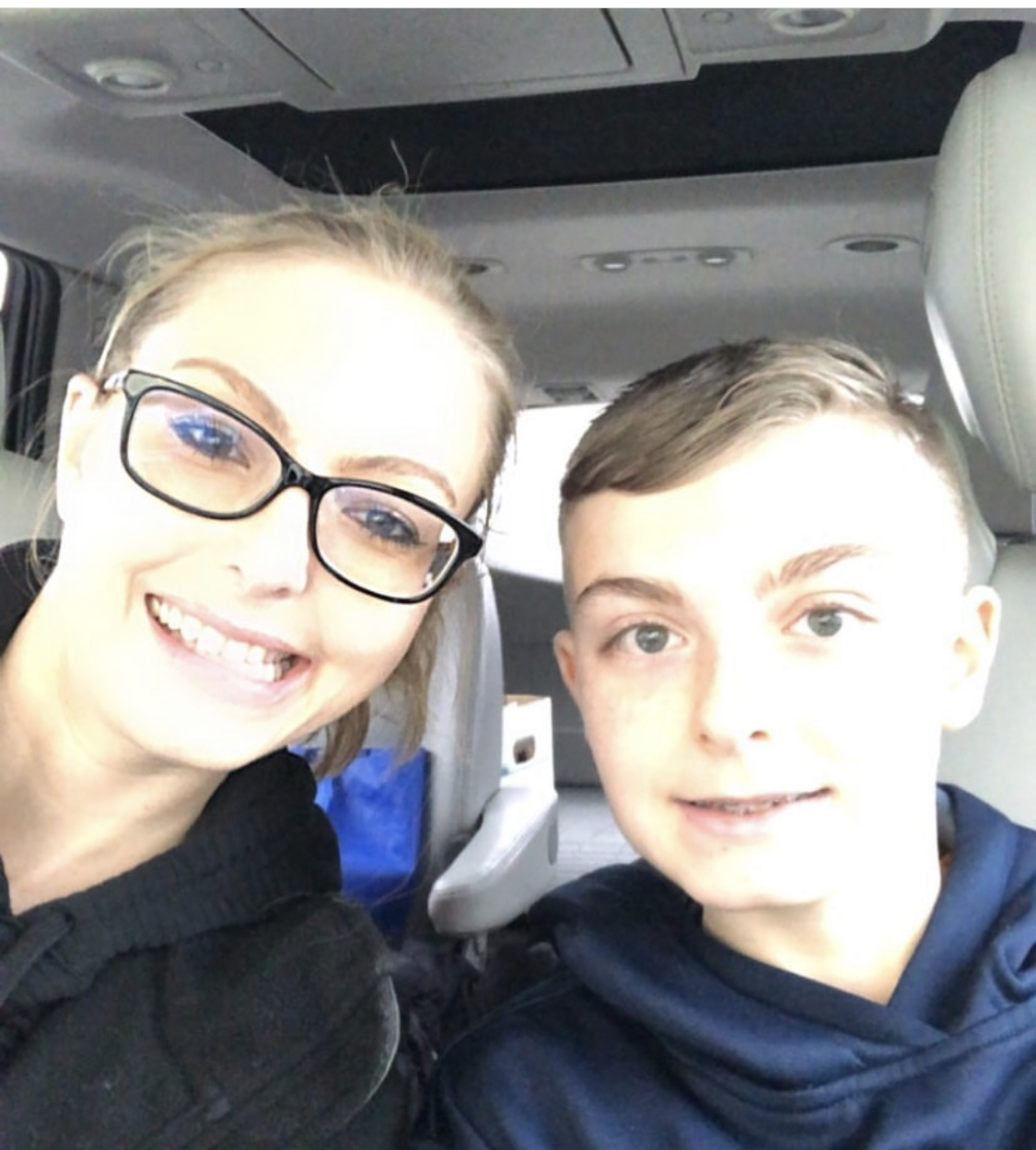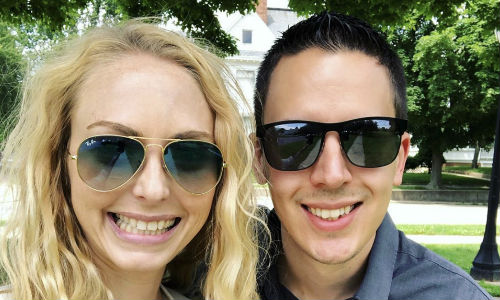At 37 years old, Stephanie O’Neal prided herself on the choices she’d made to eat healthy and exercise often. That lifestyle made it even more surprising when she dealt with the symptoms of Crohn’s disease for two months before receiving the diagnosis in October.
O’Neal not only sensed the shock of this event then but also felt separated from those around her. Nobody could completely understand, because they hadn’t experienced it. She also didn’t want to burden her immediate family – comprised of husband, Josh and 14-year old son, Isaac.
“The diagnosis was a shocker, and it’s a lot to take in. Things change in your life,” O’Neal said. “Mentally and physically, you’re alone in that moment when you don’t have anyone to talk to or a group of people who understand.”
Katherine Graff, Carle nurse navigator at the Dr. Eugene Greenberg Digestive Health Institute, recognized these same feelings in many other patients. That’s why she helped start the Inflammatory Bowel Disease (IBD) Support Group.
Interested patients can learn more or find contact information, and attendees can just drop in. There’s no registration process.
With 15 years of nursing experience, Graff began working at Carle a little more than one year ago. Her role as a nurse navigator means that she works off of a registry of digestive health patients to coordinate their care properly.
“Digestive health patients have issues that are chronic; it’s life-long,” Graff said. “Considering that peak incidents for these patients come between the years 18-35, it includes young people. More often than not, this is the first time they’ve been seriously unhealthy.
“When something becomes really different for our patients, that’s when I dig in to try to figure out what we can do to help.”
With Crohn’s disease, patients commonly experience middle or lower abdominal pain and diarrhea. Less commonly, people experience joint pain, eyelid redness and swelling, skin lesions, mouth sores, weight loss, tiredness and fever.
 While O’Neal felt isolated with her diagnosis, Graff knew the natural solution was to bring people together.
While O’Neal felt isolated with her diagnosis, Graff knew the natural solution was to bring people together.
So the IBD Support Group meets on the first Wednesday of every month from 6-7:30 p.m. The meetings occur after the traditional work day, giving attendees enough time to run an errand or grab a quick bite to eat.
When the meeting begins, conversation comes from either a designated speaker that day or a preplanned topic.
“I’ve been to every meeting so far,” O’Neal said. “Everyone is more than willing to share in this setting; nobody held back. The third meeting I went to was amazing, because we all started talking about how to best survive the holidays.
“It’s common for families not to understand our diet or realize that we can’t even have one drink.”
Talking through the issues near the time of diagnosis is one benefit. O’Neal also sees a longer lasting value to attending these meetings.
This perspective doesn’t surprise Graff, who saw this particular patient attack the disease. After learning a bit about O’Neal, one of the first things that stood out to the Carle nurse was just how prepared and educated she was on the topic.
It stands to reason, then, that O’Neal will continue to pursue more knowledge through the support group.
“We receive a perspective that supplements the doctor’s appointment,” she said. “Whether the group brings in a nutritionist, or it’s just members sharing their own perspective, we come away with helpful information.
“Even people who feel like they’re better need to continue their care. There’s no golden ticket out of this. We need this kind of support at all times.”
O’Neal not only sensed the shock of this event then but also felt separated from those around her. Nobody could completely understand, because they hadn’t experienced it. She also didn’t want to burden her immediate family – comprised of husband, Josh and 14-year old son, Isaac.
“The diagnosis was a shocker, and it’s a lot to take in. Things change in your life,” O’Neal said. “Mentally and physically, you’re alone in that moment when you don’t have anyone to talk to or a group of people who understand.”
Katherine Graff, Carle nurse navigator at the Dr. Eugene Greenberg Digestive Health Institute, recognized these same feelings in many other patients. That’s why she helped start the Inflammatory Bowel Disease (IBD) Support Group.
Interested patients can learn more or find contact information, and attendees can just drop in. There’s no registration process.
With 15 years of nursing experience, Graff began working at Carle a little more than one year ago. Her role as a nurse navigator means that she works off of a registry of digestive health patients to coordinate their care properly.
“Digestive health patients have issues that are chronic; it’s life-long,” Graff said. “Considering that peak incidents for these patients come between the years 18-35, it includes young people. More often than not, this is the first time they’ve been seriously unhealthy.
“When something becomes really different for our patients, that’s when I dig in to try to figure out what we can do to help.”
With Crohn’s disease, patients commonly experience middle or lower abdominal pain and diarrhea. Less commonly, people experience joint pain, eyelid redness and swelling, skin lesions, mouth sores, weight loss, tiredness and fever.
 While O’Neal felt isolated with her diagnosis, Graff knew the natural solution was to bring people together.
While O’Neal felt isolated with her diagnosis, Graff knew the natural solution was to bring people together.So the IBD Support Group meets on the first Wednesday of every month from 6-7:30 p.m. The meetings occur after the traditional work day, giving attendees enough time to run an errand or grab a quick bite to eat.
When the meeting begins, conversation comes from either a designated speaker that day or a preplanned topic.
“I’ve been to every meeting so far,” O’Neal said. “Everyone is more than willing to share in this setting; nobody held back. The third meeting I went to was amazing, because we all started talking about how to best survive the holidays.
“It’s common for families not to understand our diet or realize that we can’t even have one drink.”
Talking through the issues near the time of diagnosis is one benefit. O’Neal also sees a longer lasting value to attending these meetings.
This perspective doesn’t surprise Graff, who saw this particular patient attack the disease. After learning a bit about O’Neal, one of the first things that stood out to the Carle nurse was just how prepared and educated she was on the topic.
It stands to reason, then, that O’Neal will continue to pursue more knowledge through the support group.
“We receive a perspective that supplements the doctor’s appointment,” she said. “Whether the group brings in a nutritionist, or it’s just members sharing their own perspective, we come away with helpful information.
“Even people who feel like they’re better need to continue their care. There’s no golden ticket out of this. We need this kind of support at all times.”
Categories: Staying Healthy
Tags: Crohn's, Digestive Health, IBD Support Group
